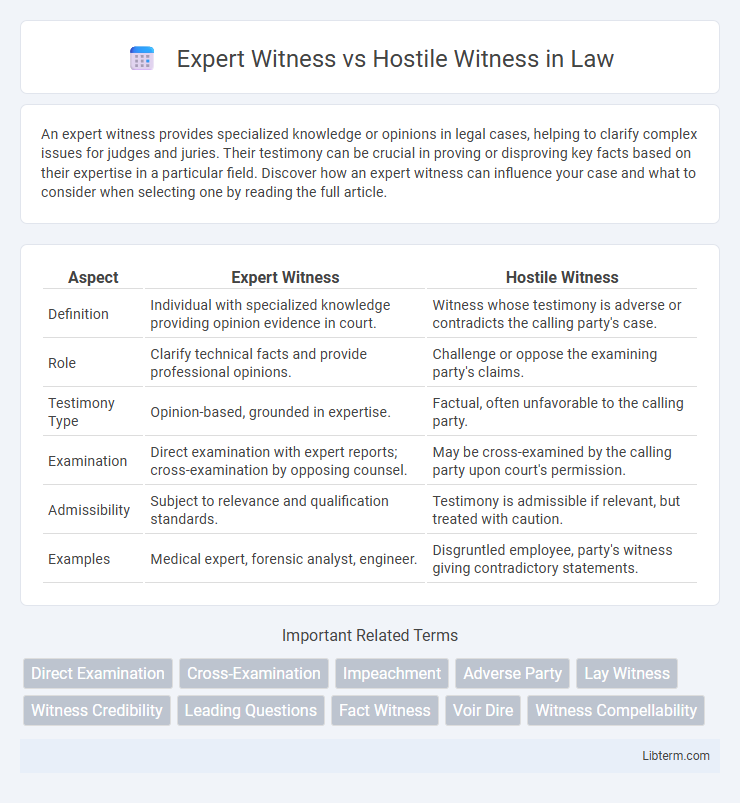An expert witness provides specialized knowledge or opinions in legal cases, helping to clarify complex issues for judges and juries. Their testimony can be crucial in proving or disproving key facts based on their expertise in a particular field. Discover how an expert witness can influence your case and what to consider when selecting one by reading the full article.
Table of Comparison
| Aspect | Expert Witness | Hostile Witness |
|---|---|---|
| Definition | Individual with specialized knowledge providing opinion evidence in court. | Witness whose testimony is adverse or contradicts the calling party's case. |
| Role | Clarify technical facts and provide professional opinions. | Challenge or oppose the examining party's claims. |
| Testimony Type | Opinion-based, grounded in expertise. | Factual, often unfavorable to the calling party. |
| Examination | Direct examination with expert reports; cross-examination by opposing counsel. | May be cross-examined by the calling party upon court's permission. |
| Admissibility | Subject to relevance and qualification standards. | Testimony is admissible if relevant, but treated with caution. |
| Examples | Medical expert, forensic analyst, engineer. | Disgruntled employee, party's witness giving contradictory statements. |
Understanding the Role of an Expert Witness
An expert witness provides specialized knowledge or expertise to assist the court in understanding technical or complex evidence, relying on qualifications, experience, and objective analysis. Unlike a hostile witness, who may oppose the party that called them, the expert witness maintains impartiality and credibility while delivering clear, unbiased opinions based on factual data and professional standards. Their role is crucial in clarifying scientific, medical, financial, or technical matters to aid judges and juries in making informed decisions.
Defining a Hostile Witness: Key Characteristics
A hostile witness is a person called to testify who demonstrates antagonism or unwillingness to provide truthful or favorable information for the party that subpoenaed them. Key characteristics include being evasive, contradictory, or openly adversarial during testimony, often requiring the examining attorney to request the court's permission to treat them as hostile. This designation allows the attorney to use leading questions and challenge the witness's credibility more aggressively compared to a friendly or non-hostile witness.
Legal Importance of Witness Classification
The legal importance of witness classification lies in its impact on courtroom strategy and evidence presentation. Expert witnesses provide specialized knowledge to assist the judge or jury in understanding complex facts, whereas hostile witnesses are identified by their adverse stance, allowing attorneys to impeach or challenge their credibility effectively. Proper classification ensures appropriate examination techniques and influences the weight and admissibility of their testimony in legal proceedings.
Qualifications and Selection of Expert Witnesses
Expert witnesses are selected based on specialized knowledge, training, and experience in a particular field relevant to the case, often requiring credentials such as advanced degrees, certifications, and professional affiliations. Hostile witnesses are typically fact witnesses whose testimony is adverse to the party who called them, and they are not chosen for expertise but for firsthand knowledge of the facts. The qualification process for expert witnesses involves a thorough review by the court to determine if their expertise will assist the jury, while hostile witnesses do not require such qualifications since their role is to provide direct evidence rather than opinion.
Identifying and Handling Hostile Witnesses
Identifying a hostile witness involves recognizing signs of adversarial behavior such as evasive answers, reluctance to cooperate, or openly opposing the questioning attorney's position. Effective handling of hostile witnesses includes requesting the court's permission to treat them as hostile, allowing leading questions that clarify inconsistencies and control their testimony. Skilled attorneys use strategic questioning techniques to discredit unreliable statements and maintain credibility during cross-examination.
Differences in Testimony: Objective vs Contentious
An expert witness provides objective testimony based on specialized knowledge, facts, and professional opinions relevant to the case, aiming to clarify complex issues for the court. In contrast, a hostile witness delivers contentious testimony marked by resistance or antagonism, often contradicting the party that called them and requiring cross-examination to challenge credibility. This fundamental difference influences how their statements are perceived and used during legal proceedings, with expert testimony being treated as impartial evidence and hostile witness testimony scrutinized for bias or reliability.
Legal Procedures for Declaring a Witness Hostile
Legal procedures for declaring a witness hostile involve the questioning attorney petitioning the court to treat the witness as adverse due to inconsistent or unfavorable testimony. The court may grant permission after observing the witness's reluctance or antagonistic behavior, allowing cross-examination techniques typically reserved for opposing parties. This declaration permits the attorney to challenge the witness's credibility and impeach their testimony under rules of evidence.
Impact on Courtroom Dynamics and Outcomes
An expert witness provides specialized knowledge that clarifies complex issues and strengthens legal arguments, often influencing the judge's or jury's understanding and verdict. A hostile witness, by contrast, challenges the calling party's case through unexpected or adversarial testimony, potentially undermining credibility and complicating courtroom strategy. The interplay between expert and hostile witnesses critically shapes courtroom dynamics, affecting the persuasiveness of evidence and the final judicial outcome.
Cross-Examination Techniques for Both Witness Types
Cross-examination techniques for expert witnesses focus on challenging the credibility and reliability of their specialized knowledge through probing questions about methodology, qualifications, and potential biases. For hostile witnesses, attorneys employ strategic questioning to expose inconsistencies, provoke admissions, and control evasive or antagonistic behavior during testimony. Effective cross-examination tailors approaches by leveraging the expert's technical expertise vulnerability and the hostile witness's adversarial stance to undermine their testimony.
Best Practices for Lawyers: Engaging with Witnesses
Lawyers must tailor their approach when engaging with expert witnesses versus hostile witnesses, emphasizing clarity and control for experts while preparing for unpredictability with hostile witnesses. Effective communication with expert witnesses involves thorough preparation of technical questions to leverage their knowledge, whereas hostile witnesses require strategic questioning to limit damaging testimony. Maintaining professionalism and anticipating witness behavior enhances credibility and the overall strength of the case during courtroom examination.
Expert Witness Infographic

 libterm.com
libterm.com